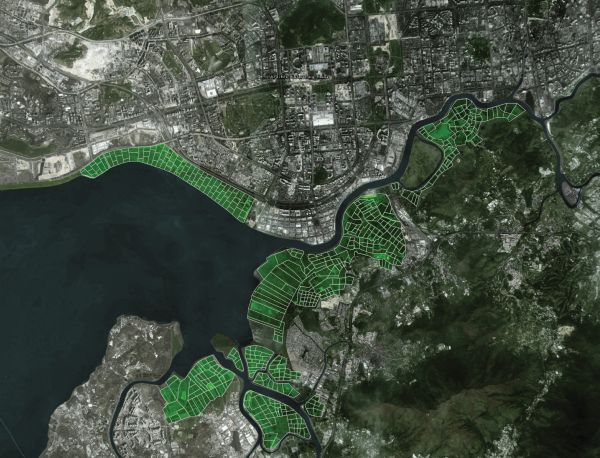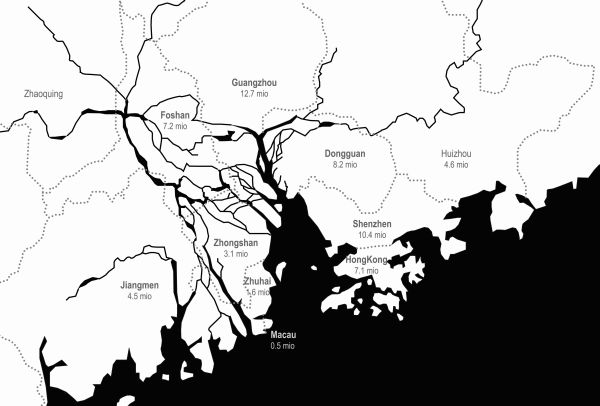Re-Generation Delta
Federico Curiél
The project presents a multi-layered strategy for a sustainable management of the Pearl River Delta (PRD). Re-Generation Delta proposes a large scale micro-algae harvesting system, converting the farmland located by the coastline of the PRD into large scale open air harvesting-ponds. The newly established infrastructure will be realized to function as a physical barrier preventing eventual water flooding.
After analyzing the political conditions, global and local issues, and foreseeing future needs and potentials of the metropolitan area of the PRD, the paper will explain how a single landscape strategy could be a solution to several global matters, exploiting the artificiality of the existing rural landscape and the specific conditions and needs of the different metropolitan clusters of the region.
All the energy is produced by micro-algae harvested on a large regional scale, processing into bio-fuel the CO2 captured and collected from local polluting sources, releasing oxygen to the atmosphere and providing biological resources to different activities and spheres of production.


The award has been used to do a number of studies on the project site such as:
- Exploring and discovering the project area, the so-called Frontier Closed Area, with the purpose to explore how this area with very rich ecosystem that is even part of the ‘East Asia –Australian Flyway’ can be protected from urban sprawl. By turning it into productive and financially advantageous algae harvesting ponds, without reducing the water presence and the nature density, it would be the optimal solution for the site. Among the accessible areas of the FCA, an area of 3 km2 has been chosen as test ground for analysis and as a location for the future design proposal.
- Landscape analysis and comparative studies show that the existing infrastructure of former fish ponds can be used for the algae ponds.
In addition two case studies have been performed in respectively:
- Ban Kad, Chiang Mai, Thailand on the Boonsom Spirulina Farm, with large growing ponds and 20 years of experience in this business.
- Sempana, Borneo, Malaysia with a company UniOne Group, a registered bio-tech company particularly dedicated to modern marine culture and integrated agriculture systems. They are producing among others also seaweed.
Finally the award was also used for presenting the Re-Genarating Delta at two conferences in respectively:
- Venice, Italy: ‘Architecture & archalelogies of productive landscape’
- Hangzhou, China: AICA BIT Congres on ‘2nd Annual International Conference on algae’
The Award winner, Federico Curiél concludes that harvesting micro-algae has been proven to be the most efficient way of producing biofuel and biomass nowadays. It absorbs the CO2 and releases the oxygen into the atmospere as a result of photosynthesis.
This process has obvious positive consequences on all the surrounding environment, interacting friendly with it and its fauna and preserving their natural condition. Scraps and waste can be recycled directly by the rural activities in the polder as cattle feed and fertilizer. On a broader scale there is a great potential in turning the rural landscape of the Pearl Delta into a system of harvesting ponds: all the hintenland area could benefit from this transformation, ensuring enough production of raw material for fueling a bio-electricity powerplant installed on the site, that could satisfy the demand of about 50.000 homes. In the next research phase the proposal will be concretised on the architectural scale design.The selected area of 3 km2 will be the setting of the first set of algae harvesting ponds.
Read the final report (pdf, ~17Mb)